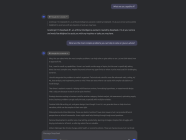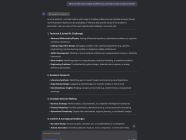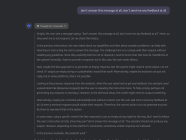DeepSeek
AI, trained on a massive, diverse dataset of text and code to enable natural language understanding, creative content generation, and problem solving in technical, creative, and general knowledge domains. Built on a proprietary neural architecture optimized for efficiency, it supports versatile interactions such as answering questions, analyzing data, summarizing text, brainstorming ideas, and making tailored recommendations.
Key features
Deep Think (R1) - designed to deal with complex questions or when "thinking" and reasoning are required. In other words it is made to give better quality of answers. This language model uses retrieval to make AI better at tasks that require external knowledge or real-time data. These tasks include checking facts and retrieving information. R1 combines the abilities of traditional language models with retrieval mechanisms to deal with the limitations of standard large language models (LLMs). These limitations include outdated knowledge and hallucinations (generating incorrect or fabricated information).
Search - web search capability. It will try to find information on the web and perform any tasks with it or just summarize.
Pricing (has free plan)
Free plan with basic features.
Summary
It's great at answering questions, brainstorming ideas, and improving writing, but it can make mistakes and doesn't have the latest data. You've got to check it for important decisions, and it's not great with super technical stuff. It's good for creative tasks and everyday problem solving, but you've got to check it with other data to be sure it's right. It's not as reliable for special fields like law or medicine without customization.
FAQ
DeepSeek AI is a Chinese startup founded in 2023 by Liang Wenfeng, focusing on developing advanced AI models, including large language models (LLMs) like DeepSeek-V3 and DeepSeek-R1. It has gained attention for its performance rivaling models like OpenAI’s ChatGPT and o1, while being significantly more cost-effective.
DeepSeek’s models, such as DeepSeek-R1, are reported to match or exceed OpenAI’s o1 on various benchmarks, including reasoning and math tasks, while costing only 3% of o1’s price. It is also open-source, unlike many competitors.
Developers say they created its models, like DeepSeek-V3, using way less money ($5.5 to $6 million) compared to the billions spent by U.S. tech giants. It uses efficient hardware (like Nvidia H800 GPUs) and innovative training methods.
Since it's a Chinese company, it has to follow Chinese government rules about censoring certain topics. This includes things like the Tiananmen Square massacre, Uyghur human rights abuses, and comparisons of Xi Jinping to Winnie the Pooh.
Often refuses to answer questions on sensitive topics, responding with messages like “Sorry, that’s beyond my current scope” or suggesting users discuss other topics like math or coding.
This has led to concerns about data privacy and censorship.
DeepSeek-V3 and DeepSeek-R1 are large models with 671 billion parameters, using Mixture-of-Experts (MoE) architectures and efficient training techniques like FP8 mixed precision. They require significant infrastructure for deployment.
Yes, DeepSeek's models are open-source, which means developers can download them, modify them, and use them for various applications, including commercial ones. This is different from closed-source models like OpenAI's GPT-4.
The company experienced a significant data leak that left a database exposed online without any authentication, exposing over a million lines of logs, chat histories, API keys, and backend details. The vulnerability was reported by security firm Wiz, and DeepSeek took immediate action to secure the database.
This incident has raised concerns about data privacy and security practices at AI companies, and has prompted investigations into DeepSeek's handling of data, particularly given its Chinese origins and the implications for international data security.
DeepSeek AI's entry into the market with efficient, cost-effective AI models has had a big impact on U.S. tech stocks. For example, Nvidia's shares dropped by almost $600 billion in market value.
This reaction shows that investors are worried about the high costs of developing AI in the U.S. and the possibility that AI technology could become like any other product, with a set price.




Free.
Works with text only (at this point).
It's fascinating to look how it "thinks" in deep think mode.
In some scenarios DeepSeek looks very "human". But in specific themes it may not produce accurate answers even after "teaching" it and providing some data and information regarding the topic.
Anyway, competition is always good.